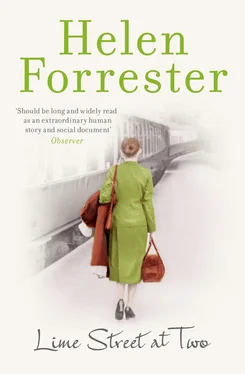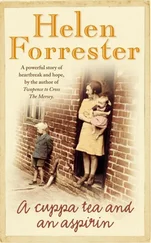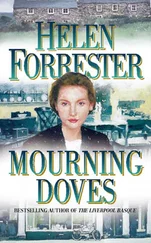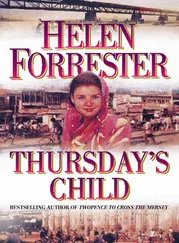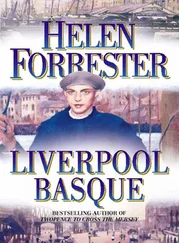At the Pier Head, the Transport Supervisor was about to dispatch a tram to my destination. It was evidently the first tram which would travel along Derby Road that morning, and I heard him tell the driver, ‘The police say the timber yards is burnin’ fierce. I tried to telephone, but the wires must be down ’cos I couldn’t get through, and nobody seems to know what’s really happening. So you mayn’t get to the end of the line.’ He paused uncertainly, and then ordered, ‘Go as far as you can. There’s no end of people as will be going on and off shift at the other end.’
The driver, his face almost purple from constant exposure to the elements, wound a huge scarf round his neck and climbed wearily on to his unprotected platform. He tinged his bell irritably with the toe of his boot, and his clippie threw away her cigarette end and skipped quickly on to the back platform. I followed her more sedately. The rush hour had not yet begun, so I was the only passenger.
The clippie was a gaunt woman in a navy-blue uniform, too short at the sleeves. She collected my fare and handed me a ticket. Then she closed the door of the passenger compartment and sat down opposite to me, to have a cosy gossip on the hardships and dangers of being a tram conductor.
‘I’m that scared sometimes at night, with no proper lights, like, and the pubs let out. It’s all right if they’re merry drunk, if you know what I mean; the worst that’ll happen is that they’ll be sick all over the floor. But if they’re bevvied and ready for a fight, or if they start to slobber all over you, well! And me man away in the Army, an’ all.’
I sympathised with her. I wondered if I could do her job. Cope with drunks, and the impertinence she would endure as a woman doing a man’s job? I doubted it.
While, out of the corner of her eye, she watched the scenes of destruction that we passed, she smoked incessantly. ‘Lot of fires,’ she remarked, and then added with a sigh, ‘I’d rather be in an air raid, at times, than face some of the men as gets on this tram.’ With the heel of her flat, laced-up shoe, she ground a cigarette end into the floor.
‘Couldn’t you get a better job?’
‘Well, it’s handy, ’cos I do split shifts, and in between I can get home to see to the kids. And the pay’s good – for a woman.’
When the tram slowed, at a point where men were still hastily clearing pieces of debris from the tram lines, she got up abruptly.
‘I’ll ask Hisself how he’s doin’,’ she said, and strode forward between the bench seats, which faced each other the length of the vehicle. She shoved back the door which connected with the driver’s platform, and smoke rolled into the passenger compartment; the poor driver must have been nearly blinded by it. I hastily pulled out a cotton handkerchief and dabbed my smarting eyes. In seconds, I could barely see anything myself.
The tram stopped.
Shadowy firemen and wardens bobbed round the vehicle and shouted up to the driver. As the result of their encouragement, the driver edged the tram forward, tinging his strident bell persistently.
As we sailed slowly past, a warden called up to him, ‘The overhead wires is still up all the way. It’s a bloody miracle.’
The tram stopped again. From behind the hanky pressed to my nose, I peeped at the stout back of the driver. A warden had swung himself up on to the platform beside him. The warden’s face was black with soot, his eyes and mouth a startling red.
‘I can’t see a thing in front of me,’ the driver protested.
‘I’ll get down and walk in front of you,’ the warden offered. ‘I’ll watch for anything on the line.’ He hopped down on to the road again, and shouted up to the driver, ‘Now, mind you listen hard for me – and don’t, for God’s sake, run me down. You can see better than you think – it’s more steam than smoke now.’ Then his voice came more faintly from the cloud of vapour. ‘Couple o’ hundred yards and you’ll see all right. And they’ll have this bit o’ trouble damped down by the time you come back.’
Once again the tram eased forward. It seemed a very long two hundred yards.
When visibility improved, the warden left us with a brisk wave of his gloved hand, and the driver accelerated. Timber flamed and crackled, as we passed the yards, and sometimes waves of heat swept through the open door at the front.
I should have been frightened, and yet I was not.
I was let down at the stop nearest to the office, and, as I walked up the side road to the dilapidated building, I was thankful to find that the immediate area appeared undamaged. It was extremely quiet, and I met no voluntary workers hurrying up the road at the same time. These middle-aged ladies were normally extremely conscientious about being prompt, and I put down their absence to the transport system being disorganised by the raid. No clients were leaning against the front door, waiting for me to let them in. Sometimes, however, if the raid had been severe, they would come streaming in from the rest centres later in the morning.
I unlocked.
The postman did his morning round very early, so I emptied the letter box, and slowly climbed the stairs, sifting through the letters as I went.
I unlocked the rooms the organisation occupied and put on the lights. The silence oppressed me. The raid must have been so bad the previous night, that people were not yet able to move around, I decided, or were still having breakfast in the rest centres.
The mail consisted largely of Government circulars, which would have to be studied, so that we could advise our clients of the latest foibles of civil servants, on the subject of servicemen’s debts, rationing, pensions of every kind, and so on. Many civil servants were tucked away in huge mansions or commandeered hotels in different parts of the country, and were in a fair state of confusion themselves; this was reflected in the muddled bureaucratic gobbledygook of their epistles.
After the letters had been scanned and sorted, I wandered round the office and went into the waiting room, to open the only window which had any glass in it. Though the air that rushed in was smoky, it smelled better than the fetid atmosphere of the room, and I leaned out to see if the buildings at the back had been damaged.
Below me, amid the weeds of the brick-walled garden, squatted a solitary soldier. He was bent over, as if taking cover.
I smiled. From the back, he looked like a Home Guard practising guerrilla tactics, and I expected that in a moment I would see one or two more of them sneak over a broken part of the wall, rifles at the ready; retired men or men on night shifts would sometimes get together in the daytime to do this. Like mothers-in-law they were a favourite cartoonists’ joke, but they tried very hard to prepare themselves to face the Germans’ professional invasion troops.
The soldier stood up slowly and signalled with a wave of his arm to someone outside my line of vision. In response, two other soldiers appeared, carrying spades instead of rifles.
The first soldier moved aside. And then I saw the object of their interest.
A dull metal pillar box was resting half on its side, much of it buried in the earth. After circling slowly round it, the men with spades began very gingerly to dig it out.
A bomb disposal squad! And a very large unexploded landmine which, presumably, the first soldier had now defused.
But if it were damaged, it could still explode.
The instinct of self-preservation sent me across the room and down the stairs quicker than the bomb could have blown me. Coatless, hatless, out of the front door I flew into the cold, smoky road.
An unattended army lorry was drawn up by the side gate, presumably waiting to transport the bomb to an open area to be exploded.
Читать дальше
